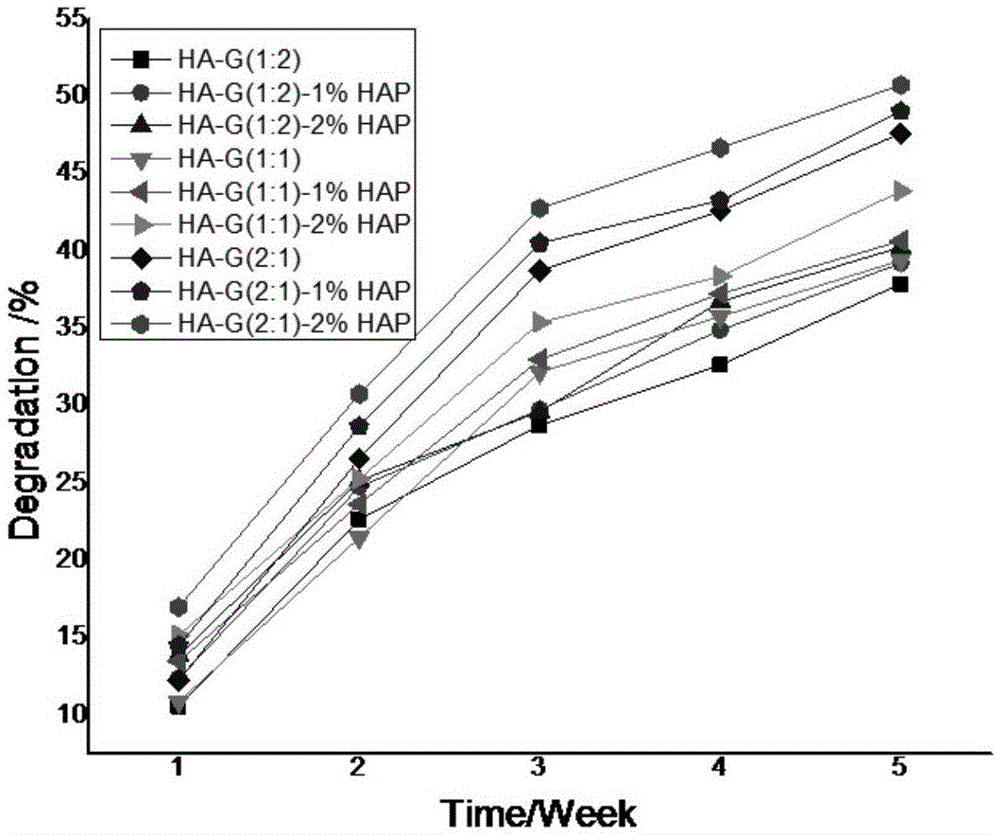Preparation method of nano-hydroxyapatite-doped porous bionic bone scaffold
A technology of nano-hydroxyapatite and biomimetic bone, which is applied in the field of preparation of porous biomimetic bone scaffolds, can solve the problems of adverse effects and refractory degradation, and achieve pore penetration, good biocompatibility, good bioactivity and osteoconduction Effect
- Summary
- Abstract
- Description
- Claims
- Application Information
AI Technical Summary
Problems solved by technology
Method used
Image
Examples
Embodiment 1
[0034] Preparation of porous hyaluronic acid (5mg / ml)-gelatin (5mg / ml) composite scaffold doped with nano-hydroxyapatite:
[0035] In a water bath at 60°C, dissolve hyaluronic acid and gelatin in triple-distilled water to obtain a 5mg / ml hyaluronic acid solution and a 5mg / ml gelatin mixture; stir to remove air bubbles, mix the above two solutions, and configure the volume ratio 1:9 and 9:1 hyaluronic acid-gelatin solutions;
[0036] After nano-hydroxyapatite is ultrasonically dispersed, it is added to the above solutions according to different mass ratios (one of the solutions does not add nano-hydroxyapatite), to form a hyaluronic acid-gelatin suspension without nano-hydroxyapatite, Hyaluronic acid-gelatin suspension containing 1 mg / ml nano-hydroxyapatite and 50 mg / ml nano-hydroxyapatite;
[0037] The above-mentioned hyaluronic acid-gelatin and hyaluronic acid-gelatin-nano hydroxyapatite mixtures were left to defoam, poured into the mold, pre-frozen at -80°C for more than 3 ...
Embodiment 2
[0040] Preparation of porous hyaluronic acid (15mg / ml)-gelatin (0.2g / ml) composite scaffold doped with nano-hydroxyapatite:
[0041] In a water bath at 60°C, dissolve hyaluronic acid and gelatin in triple-distilled water to obtain a 15 mg / ml hyaluronic acid solution and a 0.2 g / ml gelatin mixture; stir to remove air bubbles, mix the above two solutions, and prepare a volume Hyaluronic acid-gelatin solutions with a ratio of 1:9 and 9:1;
[0042] After nano-hydroxyapatite is ultrasonically dispersed, it is added to the above solutions according to different mass ratios (one of the solutions does not add nano-hydroxyapatite), to form a hyaluronic acid-gelatin suspension without nano-hydroxyapatite, Hyaluronic acid-gelatin suspension containing 1 mg / ml nano-hydroxyapatite and 50 mg / ml nano-hydroxyapatite;
[0043] The above-mentioned hyaluronic acid-gelatin and hyaluronic acid-gelatin-nano hydroxyapatite mixtures were left to defoam, poured into the mold, pre-frozen at -80°C for ...
Embodiment 3
[0047] Cell culture and analysis evaluation of porous biomimetic bone scaffold doped with nano-hydroxyapatite:
[0048] The composite scaffold designed and prepared by the laboratory was sterilized. The scaffold was soaked in 75% ethanol for 3 hours, irradiated with ultraviolet light for 1 hour, and soaked in PBS containing 10% double antibody for deep sterilization. After surface modification with type Ⅰ collagen, the above nine groups of composite scaffolds were inoculated with osteoblast precursor cells at a seeding density of 2×10 6 cells / mL, add culture medium after 6 hours of cell attachment, and after 7 days of cell culture, perform relevant staining for cell death, apoptosis, etc., detect cell proliferation and differentiation, and analyze with Image Pro software. Depend on Figure 5 It can be seen that the osteoblast precursor cells are distributed in the pores and surfaces of the scaffold in the state of clusters or single cells, and the cells and the scaffold, and ...
PUM
 Login to View More
Login to View More Abstract
Description
Claims
Application Information
 Login to View More
Login to View More - Generate Ideas
- Intellectual Property
- Life Sciences
- Materials
- Tech Scout
- Unparalleled Data Quality
- Higher Quality Content
- 60% Fewer Hallucinations
Browse by: Latest US Patents, China's latest patents, Technical Efficacy Thesaurus, Application Domain, Technology Topic, Popular Technical Reports.
© 2025 PatSnap. All rights reserved.Legal|Privacy policy|Modern Slavery Act Transparency Statement|Sitemap|About US| Contact US: help@patsnap.com



